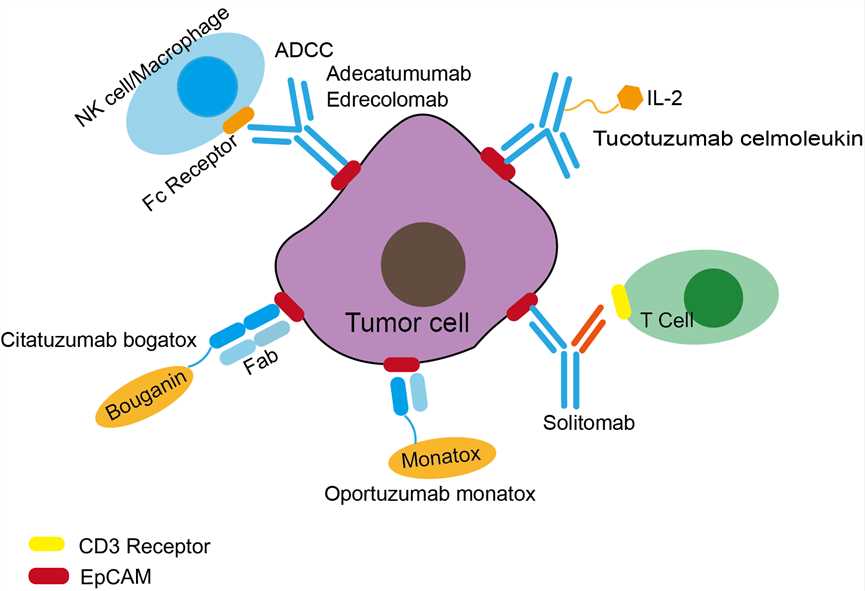

Edrecolomab Overview
Introduction of Edrecolomab
Edrecolomab, also known as MAb17-1A, is a mouse-derived IgG2a monoclonal antibody targeted at the cell-surface glycoprotein EpCAM (17-1A). This drug was developed by Centocor in an attempt to prevent colorectal cancer and adenocarcinoma. Edrecolomab has been investigated in the clinical trials for the treatment of colon cancer. Edrecolomab was licensed as an adjuvant therapy for postoperative colorectal cancer by German authorities with the trade name Panorex in 1995. However, in 2004, researchers applied edrecolomab to the study of postoperative adjuvant therapy in patients with colorectal cancer. The results showed that edrecolomab adjuvant therapy can help Dukes'CCRC patients to restore the lack of immune response in the body, but the randomized trials of clinical efficacy were unsatisfactory. Then in 2005, Edrecolomab was studied in a phase 3 randomized trial of postoperative adjuvant therapy for colorectal cancer. However, the results showed that Edrecolomab did not improve overall survival or disease-free survival in patients with stage II colon cancer treated with postoperative adjuvant therapy. Subsequently, Edrecolomab in combination with fluorouracil (FU) was used to treat colorectal cancer in the III stage. However, the results showed that the addition of ED in the basic treatment of fluorouracil had no significant effect on OS. Edrecolomab also did not prolong patient survival in subsequent randomized trials. Although Edrecolomab has not shown very good results in previous studies of colorectal cancer, it is still a promising monoclonal antibody for the treatment of adenocarcinomas expressing EpCAM.
Mechanism of Action of Edrecolomab
Edrecolomab plays an anti-tumor role by targeting tumor associated epithelial cell adhesion molecule (EpCAM, or 17-1A) antigen. Epithelial cell adhesion molecule (ECAM) is a protein that has been identified to be associated with tumor expression and is encoded by the TACSTD1 gene.
Epithelial cell adhesion molecule is a kind of cell adhesion molecule, which is involved in the interaction between cells and extracellular matrix. Epithelial cell adhesion molecules are expressed in early embryonic development and widely expressed in epithelium-derived tissues, which play an important role in homotypic cell adhesion, cell proliferation, differentiation and organ morphogenesis and maintenance. In addition, epithelial cell adhesion molecules have been found to be involved in cell migration, metastasis, cell differentiation, cell signal transduction, cell cycle regulation and metabolism. All of these functions are related to the type of protein molecules they interact with. At present, EpCAM is considered as a cell proliferation marker of many cancers, such as gastric cancer, hepatocellular carcinoma, prostate cancer, breast cancer, colon cancer and so on. Edrecolomab is a promising monoclonal antibody targeting EpCAM. When binds to EpCAM, edrecolomab can recruit immune effector cells and achieve anti-tumor effects through antibody-dependent cytotoxicity, complement mediated cell lysis and induction of anti-idiotypic networks.

Fig 1. Mechanism of Action of Edrecolomab
Table 1. Clinical Projects of Edrecolomab*
| NCT ID | Status | Conditions | Lead Sponsor | Update Time |
| NCT00227253 | Recruiting | Chromosome Aberrations; Growth Hormone Deficiency; Hypomyelination | The University of Texas Health Science Center at San Antonio | October 1, 2018 |
| NCT03655990 | Recruiting | Missing Teeth | Juvora Ltd. | September 13, 2018 |
What We Provide
Therapeutic Antibody
Edrecolomab
We provide high-quality Edrecolomab for use in WB, FC, IP, ELISA, Neut, FuncS, IF and most other immunological methods. For lab research use only, not for diagnostic, therapeutic or any in vivo human use.
Reference
* The table was excerpted from the following website
https://clinicaltrials.gov/ct2/results?term=Edrecolomab
For research use only. Not intended for any clinical use.
This site is protected by reCAPTCHA and the Google Privacy Policy and Terms of Service apply.

